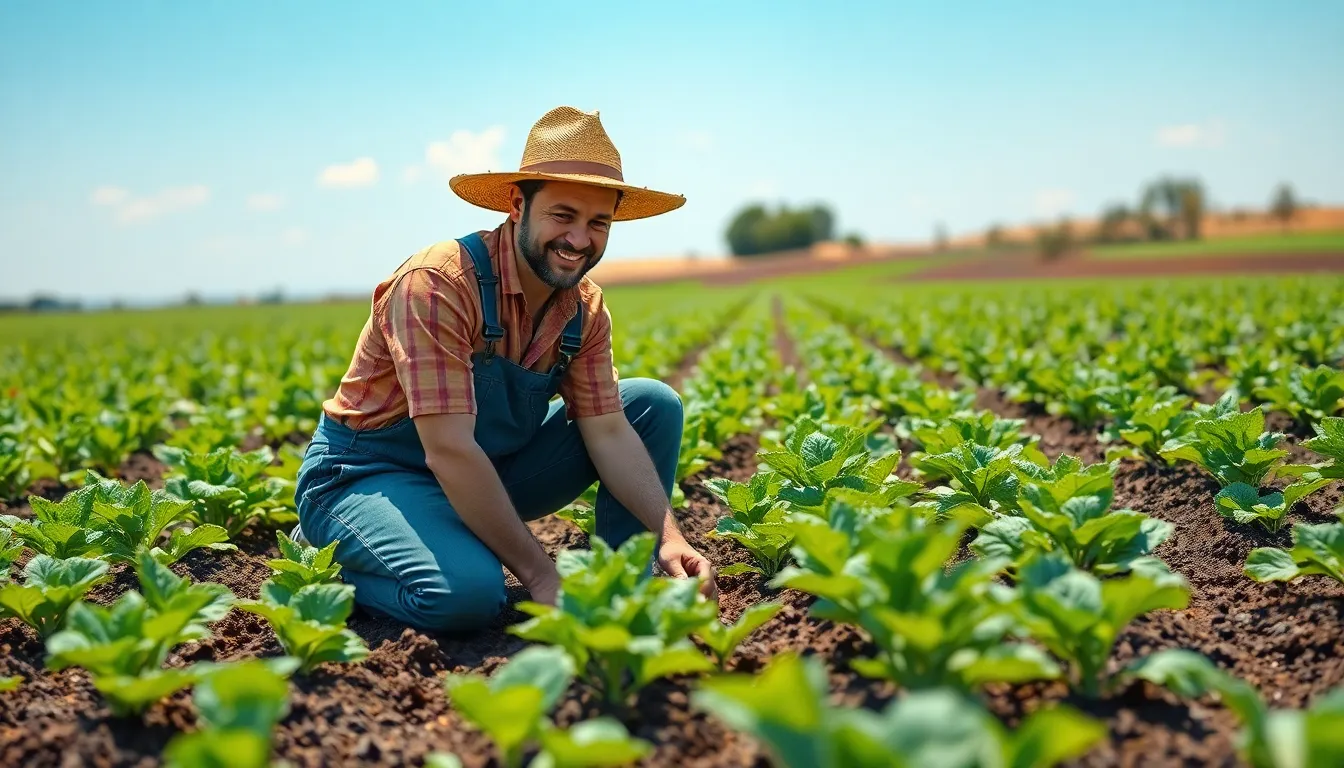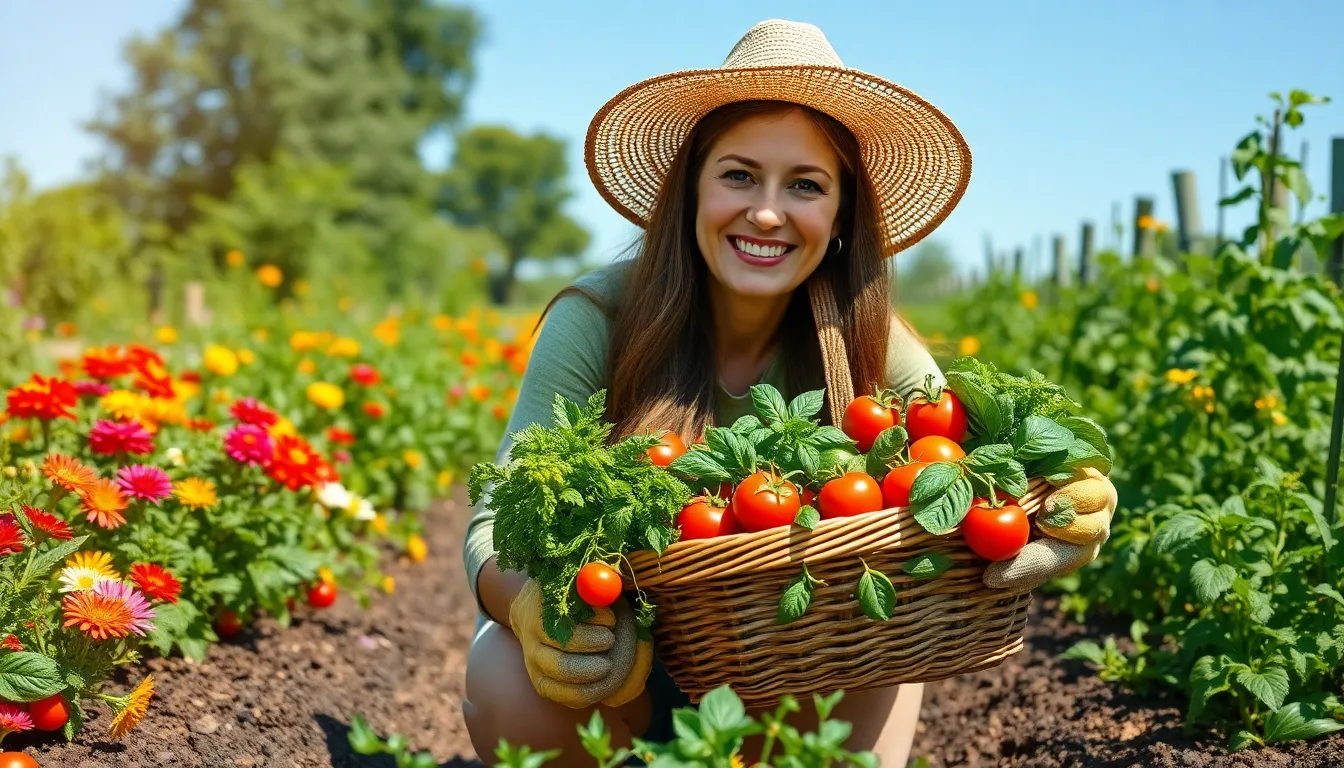Table of Contents
ToggleIn a world where the quest for healthier living often feels like a scavenger hunt, organic farming stands out as a beacon of hope. It’s not just about growing veggies; it’s about cultivating a lifestyle that’s as fresh as that first bite of a sun-ripened tomato. Imagine strutting through your garden, proudly waving your pesticide-free produce like a trophy. Who wouldn’t want that?
Benefits of Organic Farming
Organic farming offers numerous advantages that contribute to healthier living and promote sustainability.
Environmental Impact
Organic farming reduces chemical runoff, enhancing soil health. It fosters biodiversity by supporting a range of insects and wildlife. Crop rotation practices maintain nutrient balance, decreasing soil erosion. Additionally, organic methods improve water retention, which conserves water resources. Reduced synthetic pesticide use lowers pollution levels in ecosystems. Many studies indicate that organic farming practices can result in cleaner air and water.
Health Advantages
Health benefits of organic farming include access to pesticide-free produce. Research suggests organic foods contain higher antioxidant levels, which support immune function. Consuming organic products lowers exposure to harmful chemicals linked to various health issues. Organic farming prioritizes animal welfare, leading to better quality dairy and meat products. Increased availability of fresh, organic fruits and vegetables enhances diet quality. Overall, these health advantages contribute significantly to individual well-being.
Essential Organic Farming Tips

Organic farming requires careful planning and execution. Implementing effective strategies enhances productivity and sustainability.
Choosing the Right Location
Selecting a suitable site plays a crucial role in successful organic farming. It’s important to assess sunlight exposure, proximity to water sources, and wind patterns. Choosing areas with rich, well-draining soil promotes healthy crop growth. Avoiding locations with heavy pest problems or chemical contamination contributes to a thriving organic garden. Local climate conditions should also align with the chosen crops. Understanding these factors helps in creating an optimal environment for organic farming.
Soil Preparation Techniques
Preparing the soil effectively lays the foundation for successful crops. Amending soil with organic matter, such as compost or well-rotted manure, enhances nutrient content. Practicing crop rotation aids in preventing nutrient depletion and reduces pest infestations. Utilizing cover crops can improve soil structure and reduce erosion. Testing soil for pH and nutrient levels ensures specific needs are met. Adopting these preparation techniques fosters a healthy and productive organic farming system.
Crop Selection Strategies
Selecting the right crops plays a vital role in organic farming success. Strategies like companion planting and seasonal crop rotation enhance yields while maintaining soil health.
Companion Planting
Companion planting involves cultivating plants together to enhance growth and deter pests. Certain pairings, such as tomatoes and basil, boost flavors and provide mutual benefits. Marigolds effectively repel nematodes and other harmful insects, aiding in pest management. Additionally, utilizing nitrogen-fixing plants, like legumes, enriches soil nutrients. Planning combinations based on growth habits and pest resistance fosters healthier crops and maximizes space efficiency.
Seasonal Crop Rotation
Seasonal crop rotation helps prevent soil depletion and reduces pest and disease buildup. Rotating crops every growing season decreases the chances of pathogens establishing in the soil. For instance, alternating between leafy greens and root vegetables maintains nutrient balance. Specific crops, such as corn followed by beans, exemplify effective nutrient cycling. Implementing this strategy not only sustains soil health but also contributes to increased overall productivity in organic farms.
Sustainable Pest Management
Sustainable pest management plays a crucial role in organic farming. Employing eco-friendly strategies promotes crop health and reduces reliance on synthetic chemicals.
Organic Pest Control Methods
Utilizing organic pest control methods proves effective in safeguarding crops while maintaining environmental integrity. Neem oil acts as a natural insect repellent, disrupting the life cycles of harmful pests. Insecticidal soaps target soft-bodied insects, providing a non-toxic solution. Diatomaceous earth functions as a physical barrier, dehydrating pests upon contact. Introducing traps, such as yellow sticky traps, captures flying insects, enabling better management. By combining these methods, farmers minimize pest populations while fostering a healthy ecosystem.
Attracting Beneficial Insects
Attracting beneficial insects enhances pest control in organic farming. Planting flowers like cosmos, yarrow, and dill creates habitats for pollinators and predatory insects. Ladybugs and lacewings serve as natural predators of aphids, helping maintain balance in the garden. Providing diverse plant species also encourages biodiversity, promoting a robust ecosystem. Creating water sources, such as small ponds or birdbaths, supports beneficial insect populations. An integrated approach boosts pest control while supporting overall farm productivity.
Resources for Organic Farmers
Access to reliable resources is essential for organic farmers. These materials provide valuable insights, techniques, and a supportive community.
Recommended Books and Guides
Numerous books and guides exist to aid organic farmers. “The Organic Gardener’s Handbook of Tips and Techniques” offers practical advice for all skill levels. “Seed to Seed” serves as an authoritative resource for seed-saving practices. Specific guides, like “The Holistic Orchard,” focus on sustainable fruit production methods. Utilizing these resources can enhance knowledge and improve farming practices.
Online Communities and Forums
Connecting with others in the organic farming community is vital. Websites like Permies and Reddit’s r/organicgardening allow for sharing tips and experiences. Facebook groups dedicated to organic gardening offer a space for discussion and support among like-minded individuals. Participating in these communities fosters collaboration, boosting knowledge and efficiency in organic farming.
Embracing organic farming not only nurtures the land but also cultivates a healthier lifestyle. By implementing the tips shared, anyone can create a thriving organic garden that benefits both the environment and personal well-being.
The journey of organic farming is rewarding and fulfilling. It fosters a connection to nature while promoting sustainable practices. With the right strategies in place, individuals can enjoy the fruits of their labor and contribute to a greener planet.
Access to resources and community support further enhances this experience, ensuring that organic farmers have the tools they need to succeed. Ultimately, organic farming is more than just a method; it’s a commitment to a healthier future for everyone.




